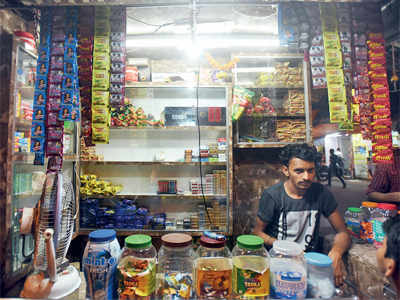Jul 7, 2018
Manufactuerers, suppliers under food safety department radar
The food safety department has been on an overdrive of late. The department has raided shops, manufacturing units and bakeries for the past two months, determined to ensure that food consumed in the district is safe. They have conducted at least 40 raids since May, which is almost a five-fold increase compared to the usual frequency of raids.
On Friday, along with the fisheries department, the food safety department raided 110 fish stalls in the Ukkadam fish market.
They say that continuous raids are for establishments to understand that they are constantly being watched. The raids are also conducted to zero in on suppliers and distributors of adulterated and banned products. Traders associations however say that food safety officials do not understand the ground reality when conducting raids and are having a field day collecting bribes.
The food safety department in the district has been going on a raid almost every day cracking down on establishments across the board, including petty shops, street vendors, godowns, manufacturing units and restaurants. In June, officials have seized 1.3 tonnes of banned tobacco products, 25 tonnes of mislabeled oil, 400 litres of expired soft drinks, low grade plastic bags and spoons and adulterated chilli chicken masala powders.
However, officials say that crackdowns will continue till they find the main manufacturers, suppliers and distributors of the above products. “When we confiscate these products from shops, we only find small quantities. The seizure does not affect them because they will get a new supply the next day,” says designated food safety officer, Dr Vijayalalithambigai.
“We want to raid and keep a watch on shops continuously so that we can find their supplier and through them their distributor,” she says. “This is especially important in cases of gutkha, haans, adulterated tea and mangoes,” she adds.
“Hitting the major distributors and their godowns will stop the products from being present in several shops,” she says.
Twenty days after 15 tonnes of fish laced with formalin were seized, officials raided all the shops in the Ukkadam fish market. They found none of the shops using any chemical preservatives. They also instructed shops to start using banana leaves to wrap and sell their fish instead of plastic covers and use mosquito nets to guard their shops and fish from houseflies.
Traders welcome the food safety department’s move to crackdown on adulterated tea, adulterated oil, misbranded oil or even expired products, but say issuing notices and levying fines to small shops and bakeries based on laws in the food safety and standards act was not practical. “Practically, we cannot do business as per the laws in the FSSAI Act. I doubt even government officials have read all the 1,000 odd pages of the act, so how can a small bakery owner have read it,” asks president of the Tamil Nadu Vyabarigal Sangam, Vikrama Raja.
“They want products to be cooled and frozen at -20 degrees celsius, which is not available with most small vendors. They want only a specific type of knife to be used to cut onions and water used by bakeries even for wetting their dough to be boiled and free of any form of contamination. We use corporation drinking water, so the department should speak to the corporation to improve their water quality instead of targeting bakeries. Small vendors can’t afford to use mineral water for every small process in baking,” he said.
“While raids to catch “unlawful” practices are good, they become an excuse and a route for other inspectors to collect bribes from vendors,” he said.
Food safety department to set norms for manufacturing edible ice

THIRUVANANTHAPURAM: The food safety department is gearing up to set norms for preparing edible ice at ice manufacturing units. This is being done after the food safety standards officials – who inspected ice manufacturing units in coastal areas – found that the ice manufactured for preserving fish and edible purposes were being made at same locations.
The inspection was conducted after suspicion arose that formalin (which is used to preserve fish) is being mixed with ice in some cases. “We are planning to ensure some standards in the industry. During inspections, we found that ice for various purposes were manufactured at the same location and there is high chance that the ice varieties will get mixed up,” said food safety commissioner M G Rajamanickam, adding that industrial preparation of edible ice warrants ISO standards.
The examination of ice samples was initiated as a follow-up action after large quantities of fish that was being brought to the state from neighbouring states were found to be preserved in formalin. In one of the cases, the formalin testing kit – supplied by Central Institute of Fisheries Technology (CIFT) – showed that a sample contained formalin. But, later it turned out to be negative when it was tested in a lab.
Rajamanickam said that this could have happened because the ice that was used in the market for preserving fish contained formalin. The usual practice is spraying it on the fish. Formalin is widely added as a preservative during transportation or storage of sea food due to its anti-microbial agent property. Repeated exposure to formalin can lead to cancer and other diseases in human beings.
In another case, an ice sample tested positive for ammonia said food safety officials. Exposure to high concentration of ammonia can cause burning sensation in eyes and respiratory tracts, resulting in blindness and lung damage. Food safety officials are now gearing up to examine fish samples by collecting them at fish landing centres along the coast.
No sale of FMCG products along with tobacco: Diktat will affect our livelihood, say shopkeepers

Notification aims to prevent kids and non-users from exposure to tobacco products
Retail association rallies against GR prohibiting sale of chips, candy, bread, soft drinks, etc at paan-beedi shops.
More than a thousand retail shopkeepers staged a protest on Thursday against a government notification restricting the sale of FMCG products alongside tobacco, lamenting the heavy dent in their livelihood the diktat will cause in an already reeling economy.
Even though the notification was issued by Food and Drugs Administration (FDA) commissioner Pallavi Darade on January 9, and is yet to be stringently implemented, the retailers are worried that the state, close on the heels of the recently-executed plastic ban, might suddenly decide to up the pressure on them.
According to the notification issued as per the provisions of the Food Safety and Standards Act, 2006, paan-beedi shops and tobacco retailers cannot sell consumer products like candy, chips, biscuits, soft drinks, bread, eggs, etc along with tobacco products. The move is aimed at preventing children and non-users from being exposed to the vice.
The Federation of Retailers Association of India (FRAI) and Mumbai Bidi Tambakhu Vyapari Sangh (MBTVS) is rallying against the rule saying that that it could severely impact the incomes of micro, small and medium retail shopkeepers across the state, even though most shopkeepers Mirror spoke to had not received any direct communication from the FDA or the government indicating that the ban has not been aggressively implemented.
Over 12 lakh retailers on edge
Shashank Rao, president, MBTVS, said, “Yes, the FDA hasn’t implemented it but that does not mean that they won’t implement it at all. We have been trying to convince the government that this will severely impact over 12 lakh retailers who rely on selling multiple products for their survival. The notification will also lead to potential harassment from the authorities.”
“Tobacco retailers in the state are already facing immense financial pressure due to extreme regulations on the tobacco industry especially on controls of advertising at the point of sale. Together these measures will increase their cost of doing business and result in an at least 40 per cent fall in their earnings,” Rao said.
Retailers say if the regulation must be implemented it should be done through a democratic, consultative process, and that they should be given time to diversify or change the nature of their business.
The notification also envisages heavy fines – Rs 5,000 for the first offence, and loss of retail licence is caught violating the norms for the third time.
Subscribe to:
Comments (Atom)





